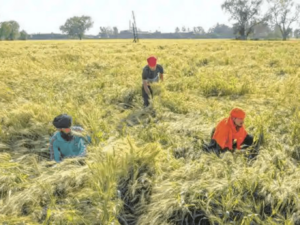The Department of Science and Technology recently released draft National Geospatial Policy inviting comments from stakeholders latest by May 22
In line with geospatial guidelines notified in Feb, this year, the draft NGP seeks to embolden geospatial data, workforce and ecosystem through PPP
NGP may fail to provide personal data privacy and safety arising out of locational information due to the lack of dedicated personal data protection laws
The geospatial market of India is expected to hit INR 1 Lakh Cr by 2029-2030 from the existing level of INR 15,000 Cr. However, private investments in the sector have been limited due to uncertainties in government policies.
Recognising that the regulatory paradigm in the government through various acts, rules, policies and guidelines has not been in sync with the geospatial developments in the country, the Indian government, in February this year, deregulated the geospatial sector.
The Department of Science & Technology (DST), has now come up with a draft National Geospatial Policy (NGP) inviting comments from stakeholders from across the country, latest by May 22.
The guidelines issued by the DST seek to liberalise the mapping industry to spur domestic innovation and enable Indian companies to compete in the global mapping ecosystem.
What Is Geospatial Data?
Geospatial data primarily stands for location-related data. It includes data about the natural or man-made, physical or imaginary features whether above the ground or below, boundaries, points of interest, natural phenomena, mobility data, weather patterns, statistical information, etc. Geographic information is thus just one part of geospatial data.
Numerous geospatial technologies such as ground-based survey techniques, photogrammetry using manned/unmanned aerial vehicles, terrestrial vehicle-mounted mobile mapping system, LIDAR, RADAR Interferometry, satellite-based remote sensing, mobile phone sensors and other techniques are deployed to collect geospatial data.
Why Does It Matter To The Startup Ecosystem
Real-time geospatial data plays a key role for today’s marketplaces and other tech startups. For instance, once a platform knows the exact location of its users, it immediately customises its offering in accordance with the location preference. Location is critical to the success of most tech startups offering location-based services such as ecommerce, agritech, healthtech, delivery and logistics and urban transport.
Some of the crucial geospatial technologies have so far been dominated by the US players like Google, Microsoft and US government-owned GPS. With NGP, the government aims to not only liberalise the geospatial data which will be accessible and available to everyone but also promote local players to come forward and use geospatial technologies such as UAVs, remote sensing techniques, internet mapping technologies, generate reliable data, etc. These technologies will be used for the coordinated development, maintenance, and dissemination of geospatial data in accordance with NSDI Resolution, 2006.
India is at a nascent stage in the geospatial sector and currently, state and central governments are going to be key adopters and buyers of the geospatial data.
The government policy points out the dearth of professionals for mining geospatial data. It proposes skill development initiatives in partnership with government, industry, academia and research institutions and developing incubation models to support geospatial entrepreneurship across various sectors.
Key infrastructural requirements for the development of the geospatial sector include:
- Mapping infrastructure
- Positioning infrastructure
- Earth observation infrastructure
- National data registry and geo-platforms
- Subsurface and hydrographic infrastructure
The policy expects startups to collaborate with the governments in order to meet their technology requirements. “A level playing field will be provided for government, non-government, academic, research and private sectors for ease of business and pro-actively engaging them in various spheres of the geospatial domain for employment generation and contribution to the national economy. Proactive steps will be taken for stimulating geospatial technological innovation and supporting the growth and development of the geospatial industry in the country,” says the draft policy.
A Giant Reform Since 2016
Draft National Geospatial Policy is a giant leap forward in comparison to the previous draft Geospatial Information Regulation Bill (GIRB) 2016.
In the aftermath of the Pathankot terrorist attack in 2016, which the National Investigation Agency (NIA) concluded was done with the help of Google Maps and Facebook, the Ministry of Home Affairs, Government of India had come up with the draft Geospatial Information Regulation Bill (GIRB).
The draft GIRB had proposed stiff fines of up to INR 100 Cr and jail-time for individuals and companies that would wrongly depict India’s map such as areas of Jammu & Kashmir, and planned to introduce a permit system for the production of geospatial data and severe restrictions on the dissemination of geospatial data. This would have stopped Ola, Uber and Google who crowdsource geospatial data to build their maps.
However, better sense prevailed and the government decided to drop the draft.
Having deregulated the geospatial sector in February this year, the latest draft NGP is being seen as a roadmap to strengthen the geospatial infrastructure through a public-private partnership, cutting-edge technologies, building geospatial skilled workforce and professionals.
By increasing the availability of high-quality, timely and reliable geospatial data and information, the NGP intends to provide/unleash/encourage:
- The potential of geospatial sector in knowledge and wealth creation and providing for an enabling environment
- Ease of doing business
- Augment geospatial education in the country by ‘catching them young’ and igniting geospatial spark in young minds from school level onwards
- Standardisation and certification of courses and skill sets
- Level playing field for government and non-government sectors
- Encourage creation and incubation of ideas and startups
- Availability of real and near real time data and information
- Reducing the duplication and wastage of efforts in producing geospatial data
- Promote collaboration, including PPP, between various agencies in production and use of geospatial data
- Survey of India (SoI) topographic data to be treated as a common good and made easily available Geospatial data and information produced using public fund to be shared as per NDSAP
- Standardisation of formats so that Geospatial data is available in an interoperable machine-readable form
- Assessment of the sensitivity of geospatial data and information for sharing to be done weighing security/strategic considerations against the potential contribution to socio-economic development
- Moving away from the regime of prior security-vetting of geospatial data and information to trusting businesses and individuals and their responsibility/accountability under various laws, rules and guidelines
The policy has proposed that the Geospatial Data Promotion Committee that maintains a negative list that would comprise areas not marked on the maps among other sensitive attributes, will be rechristened as the Geospatial Data Promotion and Development Committee.
Also, to improve the surveyors’ skill sets, an Act will be legislated similar to Advocates Act, Indian Medical Council Act and Chartered Accountant Act that govern advocates, medical professionals, CAs respectively, to maintain the quality of survey professionals.
Does NGP Address The Data Privacy And Security Concerns?
It is worth noting that geospatial data may not always be related to personal data or datasets that may identify individuals and therefore, it does not directly fall into laws pertaining to personal data protection and security.
However, according to the World Geospatial Industry Council report, if the information attributed to the geospatial information is about individuals or it allows individuals to be identified, the geospatial information automatically becomes personal data, and data protection legislation applies. Thus, the European geospatial data policies are in sync with the GDPR (General Data Protection Regulation) as the GDPR also specifically mentions ‘location data’ as a possible identifier through which an individual can be identified.
NGP highlights that each national and state-level partnering agency will protect personal privacy and maintain confidentiality in accordance with prevailing policies, acts, rules & regulations. It also states that appropriate legislation to enforce different provisions of the Policy will be brought in due course. However, existing laws like Indian Penal Code, IT Act, Corporate laws, data and privacy laws, etc., will be applicable as required.
In India, however, as the Indian government has been sitting on the draft Personal Data Protection Bill for the last three years, there is no strong law to ensure personal data privacy. A number of government-operated and private company-owned platforms have reported data leaks in recent times. However, the culprits have never been punished due to the lack of stringent data policies. The new draft Personal Data Protection Bill too is toothless, believes Justice BN Srikrishna who had chaired its drafting committee.









